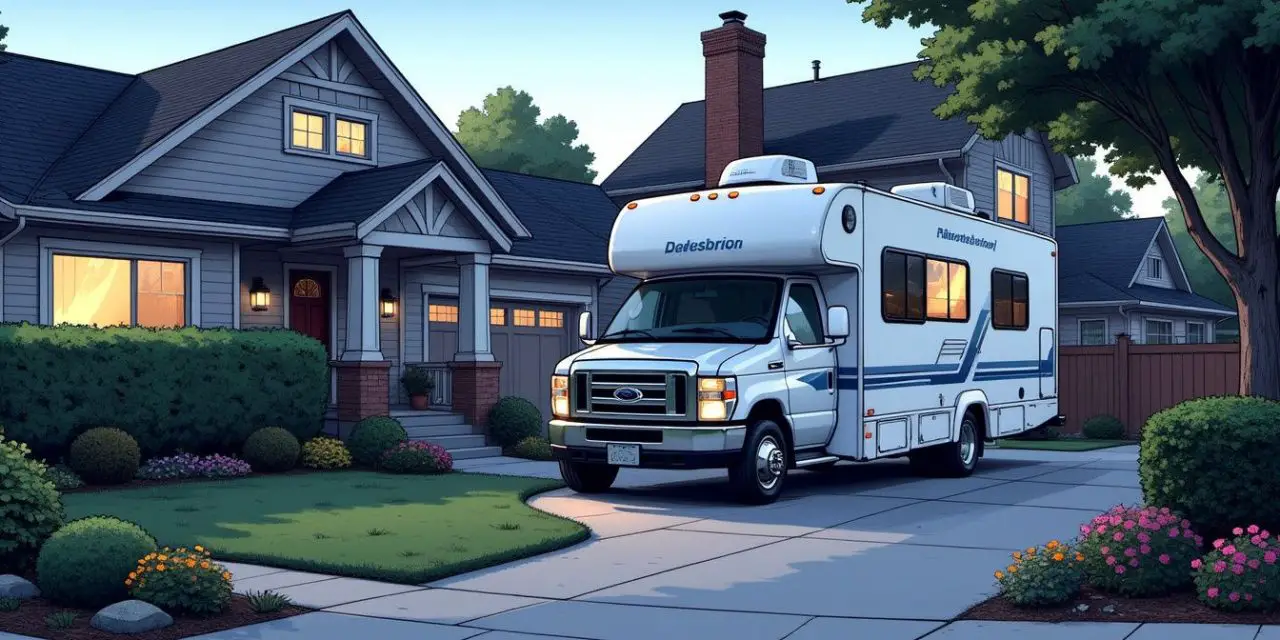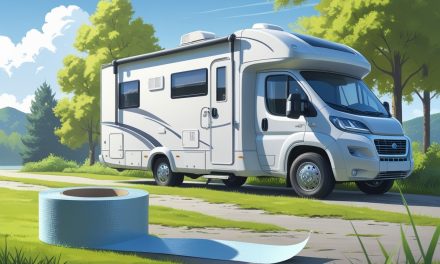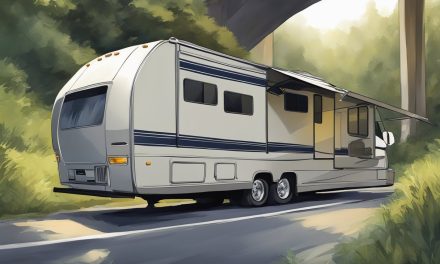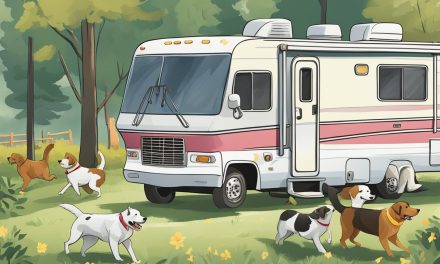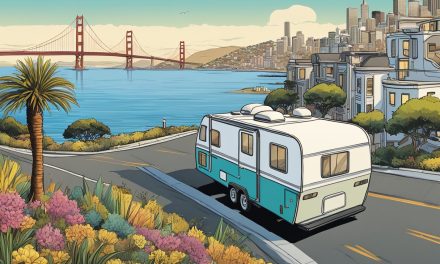Thinking about parking your RV in your driveway? Local zoning laws and HOA rules often have strict guidelines. This guide breaks down the regulations, restrictions, and smart tips for hassle-free parking.
Keep reading to learn how to avoid fines and neighbor complaints.
Regulations for Parking an RV in Your Driveway
Local zoning laws often limit RV parking in driveways—some ban it outright, while others allow short-term stays. Check your HOA rules too, as many restrict RV size or require permits for extended parking.
Driveway surfaces must support the vehicle’s weight, and setback rules may force you to park a certain distance from sidewalks or property lines. Always verify local codes before settling on a spot.
Would you like to save this article?
Zoning laws and residential property limits
Zoning laws control where you can park an RV on residential property. Urban areas often have tighter rules than rural ones. Some cities require RVs to stay behind the front of the house and on paved surfaces like concrete or asphalt.
Sacramento County allows RV parking if the vehicle is operational and registered to the homeowner.
Rules vary by location. Contra Costa County demands boats and RVs be 90% hidden from public view. In Solano County, driveway parking is fine as long as the RV doesn’t block street traffic.
Elk Grove has strict spacing rules—RVs must sit 20 feet from sidewalks and 12.5 feet from corner property lines.
Local zoning laws aren’t just red tape—they’re neighborhood peacekeepers.
Homeowners associations add another layer of restrictions. Check their guidelines next.
Homeowners Association (HOA) rules
HOA rules can make or break your plans to park an RV in your driveway. Many HOAs ban visible RV parking in front or side yards. Violations may lead to warnings, fines, or even forced relocation.
Some associations allow short-term parking for trip prep—but long-term storage is usually off-limits.
HOA rules often go beyond local zoning laws. They might require RVs to stay hidden behind fences or stored in rear yards. Temporary use permits could be needed for exceptions. Shared driveways must follow both HOA and zoning rules, so check agreements with neighbors first.
Ignoring these rules risks citations or legal action.
Time restrictions and overnight parking guidelines
Many cities set strict limits on how long you can park an RV in your driveway or on the street. Sacramento, for example, bans driveway storage entirely and caps street parking at 72 hours.
Fontana allows oversized vehicles like RVs to park for 72 hours per permit, with a max of six permits per month.
Some areas require RVs to stay hitched to a tow vehicle if parked on the street—Sacramento County enforces this rule. Broken-down RVs may get a short grace period, like Fontana’s 8-hour emergency window.
Always check local zoning laws and homeowners association (HOA) rules before settling in. Moving on, size and height limits also play a big role in parking restrictions.
Common Restrictions to Consider
Local zoning laws may limit RV size or require setbacks from property lines. Some areas also ban extended stays due to neighborhood appearance rules.
Check if your HOA enforces rules on outdoor storage or utility connections for parked vehicles.
Size and height limitations
Parking your recreational vehicle at home? Check local rules first—many areas enforce strict size limits on motorhomes campers travel trailers stored outdoors In Alameda County California driveways cannot hold rigs wider than thirty feet Overhead power grids nearby trees also demand clearance so taller units risk violating safety codes
Some cities like Elk Grove ban oversized rigs blocking sightlines unless properties span two acres Fontana allows box trailers without extra permits provided both license plates show up properly Always measure before settling into long term stays near curbs sidewalks
Distance from property lines and sidewalks
Beyond size limits—where your recreational vehicle sits matters too—many cities enforce strict setback rules…
Most towns require RVs parked on driveways stay five-to-ten feet back from curbs—sidewalks included—to keep paths clear… Elk Grove takes this further; their law says motor homes must sit twenty feet away if near pedestrian walkways…
Corners have tighter limits there too—just twelve-and-a-half feet off lot edges helps drivers see around them safely… Some areas like Fontana ban rigs hanging over public pathways entirely…
Others demand units tuck behind house fronts before counting as legal placements… And forget squeezing close beside gas meters either since utilities need breathing room… Even greenery plays its role under codes similar Contra Costa County’s ninety percent screening rule tying bushes directly onto boundary spacing debates during inspections….
Visual impact and neighborhood aesthetics
Many neighbors see RVs as an eyesore when parked in driveways for long periods. To keep the peace, screening them with fences, plants, or structures helps hide them from public view.
Some places like Contra Costa County even require 90% visual coverage before allowing driveway parking—others ban visible RV storage entirely if seen from the street.
Ignoring these rules can lead to complaints or code violations. Landscaping and proper placement away from sidewalks reduce visual clutter—keeping the vehicle out of sight keeps neighborhoods looking tidy while avoiding conflicts with local zoning laws or homeowner associations (HOAs).
Simple screens go a long way in maintaining good relations with neighbors too.
Tips for Parking an RV in Your Driveway
Use RV covers or screens to keep it tidy—check local rules, protect utilities, and talk to neighbors to stay on good terms… Find more ideas below.
Use covers or screens for better appearance
Parking an RV in your driveway doesn’t have to clash with neighborhood aesthetics. Screens, fencing, or plants can hide the vehicle from view—Contra Costa County even requires 90% screening for boats and RVs stored on private property.
Solid fences or temporary structures work well too, keeping the RV out of sight and reducing complaints from neighbors.
Covers also protect your recreational vehicle from weather damage while meeting local rules. Some areas—or HOAs—demand RVs stay hidden below fence lines. Landscaping like shrubs or vines offers a natural screen if permanent structures aren’t an option.
Keeping things tidy helps avoid zoning violations and keeps the peace on your street.
Ensure proper driveway space and utility access
Your driveway needs enough room to fit the RV without violating local rules. Many areas require paved surfaces like concrete, asphalt, or gravel for recreational vehicles—check your town’s zoning laws first.
Keep the RV clear of gas meters, fire hydrants, and overhead power lines for safety.
Parking an RV isn’t just about space—it’s about following codes and keeping neighbors happy.
Slopes and blind spots matter too. Fontana, CA bans RVs from sticking out past public walkways—measure carefully before parking. Leave space for regular vehicles to pass easily. If utilities are blocked, you could face fines or forced relocation of your RV storage spot.
Clear access keeps everyone safe and avoids disputes with homeowners associations (HOAs) or city inspectors.
Communicate with neighbors to avoid conflicts
Letting neighbors know about your RV parking plans can help keep the peace. Temporary parking—like before a camping trip—is usually more accepted than long-term storage, but complaints could trigger code enforcement checks.
A clean, well-maintained RV also reduces negative reactions.
Some HOAs or towns require advance notice for extended stays. Putting it in writing—like a simple agreement if sharing space—can prevent disputes later. Keeping open communication ensures everyone stays informed and avoids surprises related to residential zoning rules.
Alternatives to Parking in Your Driveway
Many RV owners rent storage units—some offer power hookups and security. Nearby RV parks provide full hookups, dump stations, and easy access to utilities.
Consider campgrounds with long-term stays—they often include water, sewer, and even solar hookups. Local zoning offices may have lists of approved commercial storage lots too.
Renting RV storage space
Renting RV storage space helps avoid zoning violations and keeps your neighborhood looking tidy. Websites like Neighbor.com/rv-storage, Uhaul.com, and SpareFoot.com offer options—some with security, electricity, or water hookups.
Indoor and outdoor facilities are available, letting you choose based on access and protection needs. Companies like RecNation provide flexible solutions nationwide, while private property leases via Neighbor.com may save costs.
Storage professionals at National Indoor RV Center recommend regular maintenance if storing longer-term. Costs vary by amenities—check local parking regulations before picking a facility.
Some campgrounds and RV parks also offer short-term spots if you need a temporary solution. Solar panels or septic system hookups might be available at higher-end locations.
Parking at RV parks or campgrounds
RV parks and campgrounds provide a hassle-free option if you can’t park your RV at home. Many offer amenities like water, electric hookups, showers, and laundry facilities—making them practical for short or long stays.
They often include recreational areas too, adding social perks to storage solutions. Some even allow seasonal or year-round parking with added security and maintenance services.
Finding an RV park is easy with national directories—just check local regulations first since some areas limit long-term stays. Costs vary by location and season but may be worth it for extra benefits over driveway parking.
Storage fees could be higher than DIY options though—weigh the trade-offs before committing to a campsite spot near your chili cook-offs or road trips!
Conclusion
Parking an RV in your driveway is possible—but local rules matter most. Check zoning laws and HOA guidelines to avoid fines or disputes. If space is tight, storage lots or campgrounds offer a solid backup plan.
Stay proactive by talking to neighbors and keeping your setup tidy. With the right steps, you can find a parking solution that works for everyone.

